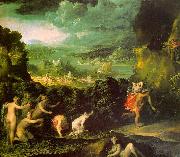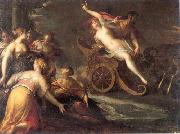Wholesale Oil Painting Reproductions No Minimum and Door to Door! |
|||||||||||
|
|
|||||||||||

|
|||||||||||
|
|
|
||||||||
All ABBATE, Niccolo dell Oil Paintings |
||||||||
|
|
||||||||
|
|
||||||||
|
Artist Introduction: Italian Mannerist Painter, ca.1512-1571
Italian painter. He was trained in Modena and developed his mature style under the influence of his contemporaries Correggio and Parmigianino in Bologna (1544 ?C 52). There he painted portraits and decorated palaces with frescoes of landscapes and figure compositions in the Mannerist style. In 1552 he was invited by Henry II of France to work under Primaticcio at the Palace of Fontainebleau, where he executed immense murals (most now lost). He remained in France the rest of his life. His mythological landscapes were a principal source of the French Classical landscape tradition, and he was a precursor of Claude Lorrain and Nicolas Poussin. |
||||||||
|
|
||||||||
|
The Rape of Proserpine Painting ID:: 40390 |
mk156
1552-70
Oil on canvas
196x216cm
|
|||||||
Height Width |
INS/CM Quality |
|||||||
|
X |
| |||||||
|
|
||||||||
All Hans von Aachen Oil Paintings |
||||||||
|
|
||||||||
|
|
||||||||
|
Artist Introduction: was a German mannerist painter.
His name is derived from the birth place of his father, Aachen in Germany. Other variations of the name include Johann von - and - von Achen and various concisions like Janachen, Fanachen, Abak, Jean Dac, Aquano, van Aken etc.
Hans von Aachen began painting in Germany as a pupil of the Flemish master E. Jerrigh. He then moved to Italy in 1574 to study further. He toured Rome and Florence, but eventually settled in Venice. He initially became a pupil of Kaspar Rems, but soon decided to develop his own mannerist technique, by studying Tintoretto and Michelangelo's followers. However, during all of his life he was influenced by the style of Bartholomeus Spranger and Hendrick Goltzius who dominated the art scene in Germany at the time.
He returned to Germany in 1588 where he became well known as a painter of portraits for noble houses. He painted several works for Duke William V of Bavaria. He married Regina, the daughter of the composer Orlando di Lasso in Munich. In Munich he came into contact with the Imperial Court in Prague. In 1592 he was appointed official painter of Rudolph II, Holy Roman Emperor. However, Von Aachen only moved to Prague in 1601, where he stayed painting commissions from Emperor Rudolph II, and later from Matthias I.
Amongst van Aachens pupils were Peter Isaak and Joseph Heinz. His works have been copied by Wolfgang Kilian, Dominicus Custos and Jan Sadeler.
|
||||||||
|
|
||||||||
|
|
The rape of Proserpine Painting ID:: 67878 |
Year 1587(1587)
Technique Oil on canvas
Dimensions 109 X 150 cm
|
||||||
Height Width |
INS/CM Quality |
|||||||
|
X |
| |||||||
|
|
||||||||
|
Prev Next
|
||||||||
|
|
||||||||
|
Related Paintings to Hans von Aachen :. |
||||||||
|
|
||||||||
|
CONTACT US |


